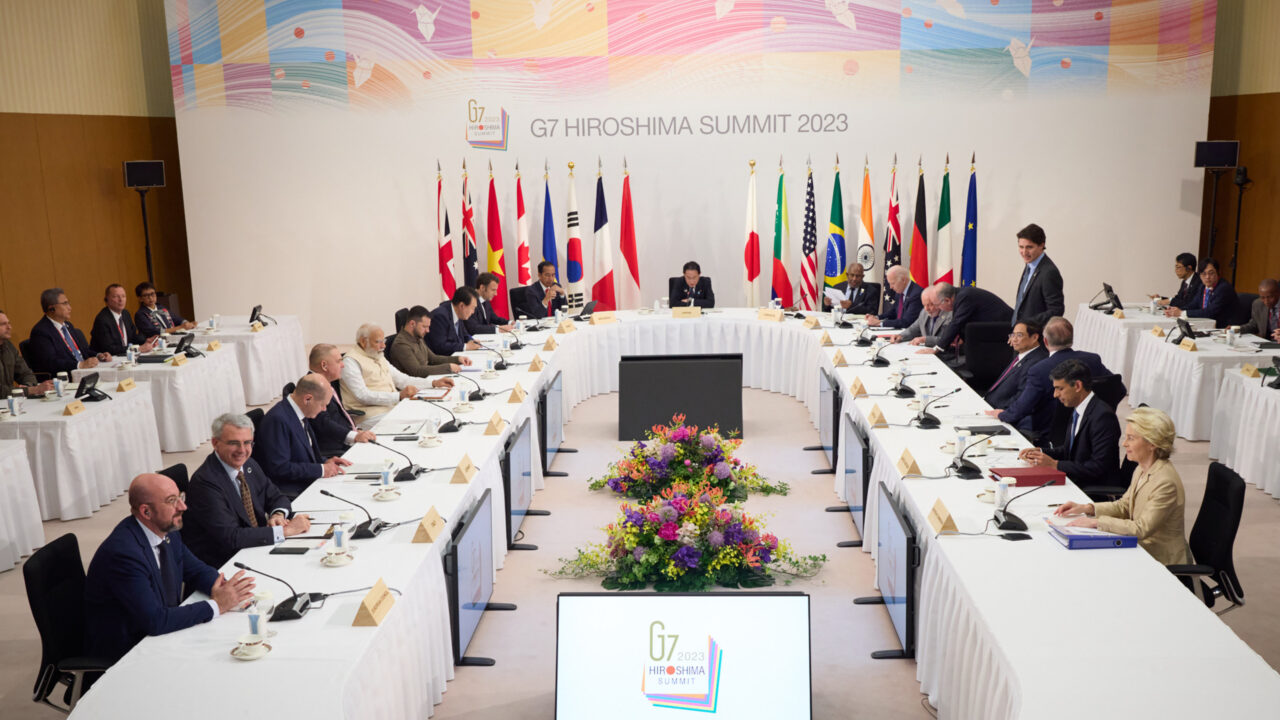The new central front: Japan’s special role in the West’s strategic rivalry with China
Japan’s approach to economic security provides valuable lessons for Europe about effectively navigating the challenges posed by a rising China
The central front in the West’s strategic rivalry with China is east Asia. Of course, the competition with China will be global and economic – it will take place in every region of the world and across many issue areas. But in any such competition, there is a centrality to the possibility of war and a reality to geographical competition that is irreducible. Just as Europe played a central role in the cold war, east Asia will be the main source of crises and contain the greatest risk of a possible war with China.
Japan anchors that central front. Tokyo is, for both Europe and the United States, the key partner for understanding and containing the strategic risks that China poses to the region. Japan’s prime minister Fumio Kishida seeks a “stable and constructive” relationship with China, but Japan also knows that it needs to move beyond such platitudes and introduce specific steps and strategies that protect Japan’s national security and regional stability. In the process, it has begun to develop a framework for dealing with a rising China in the Indo-Pacific that both Europe and the US can and should support. From a European perspective, that means particularly understanding and supporting the Japanese concept of economic security.
Threat is the mother of invention
Beijing’s growing military strength has Tokyo on edge. Russia’s attack on Ukraine has dramatically demonstrated to Japan the real risks of military conflict. China’s military build-up and increasingly assertive claims over Taiwan have sparked fears in Tokyo of a war in the Taiwan Strait. As Japan is only 110 kilometers away from Taiwan, a conflict there would have immediate consequences for Japanese security.
Japan began a dramatic transformation of its defence posture with a new National Security Strategy (NSS) last December. The new approach represents a comprehensive expansion of Japanese security interests beyond the defence of its own territory. Japan is now taking a broader global view of its security and is actively expanding its strategic partnerships beyond the US. As in Europe, Japanese officials are becoming concerned that the US capabilities to defend Japan are limited.
Japan’s concerns, however, extend beyond the threat of war. China remains Japan’s largest trading partner, and Japan is still dependent on Beijing as a sales market, manufacturing base, and source of critical resources, which poses grave economic security risks. Already in 2010, when the dispute between Tokyo and Beijing over the Senkaku/Diaoyu islands boiled over and China restricted its rare earth exports to Japan, Japan started moving in the direction of strategic decoupling from China.
For the past ten years, Japan has pursued measures that enhance its economic security and has reshored manufacturing with partners, especially ASEAN states, to find less risky sources. Japan’s new NSS argues that economic competitiveness and national security are inextricably linked. Japan is the first country to have enacted an economic security bill and has created the position of economic security minister.
Japan’s G7 message to Europe
It is on economic security that Europeans can learn most from Japan and reinforce Japanese efforts to manage the rivalry with China. Japan used its recent presidency of the G7 to send, in its own quiet way, an urgent message to its partners on economic security. The G7 Hiroshima summit in May produced the first ever G7 Statement on Economic Security. Europeans, in particular, should listen to that message and understand what it means.
With Kishida at the helm, the G7 leaders amplified their denunciation of China and sent a strong message of unity. In a joint communiqué, the group criticised China for its use of “economic coercion,” militarisation of the South China Sea, and “interference activities”. The statement marks the group’s strongest ever criticism of Beijing. The G7 also took the first steps towards collectively dealing with the Chinese economic threat by launching the new Coordination Platform on Economic Coercion.
In Hiroshima, the G7 showed that it will increasingly focus on China and try to develop a coordinated policy approach
In Hiroshima, the G7 showed that it will increasingly focus on China and try to develop a coordinated policy approach. But the common concerns expressed by the group do not automatically lead to agreement on how to address them. Now is the time for G7 members and their allies to seize this momentum and move forward with discussions on how to concretely implement what this G7 summit has signalled. The well-established relationship between the European Union and Japan should be used to do just that.
The EU has started to address economic security issues for itself, but it has made little progress thus far. Individual member states are still struggling to define their own relations and strategies towards China. Countries such as Germany remain concerned about putting their economic relationship with China at risk and tend to downplay Chinese economic and military threats.
The Japanese experience can demonstrate both the realities of Chinese strategic competition and the opportunities to collectively manage the risks coming from China. It can show how to strengthen and adjust the European economic approach towards China and provide the EU with improved situational awareness and economic intelligence to address regulatory blind spots. It can particularly help Europeans understand that a degree of sectoral decoupling is necessary and possible. For this, dialogues between the EU and Japan should go beyond the political and administrative level and a more regular or institutionalised business exchange between European and Japanese companies in critical sectors – which are on the frontlines – should be encouraged.
Japan now understands that it needs as many different allies and partners as possible to deal with China. Japan’s security policy focus has often been limited to its relationship with the US, with less attention paid to Europe. But fears about the US commitment and a realisation of the importance of economic security mean that Tokyo is increasingly reaching out to like-minded or friendly nations, such as Australia, the United Kingdom, India, and the Philippines. The EU and its member states should embrace this trend. And most importantly, they should listen to what their friends are saying on the central front.
The European Council on Foreign Relations does not take collective positions. ECFR publications only represent the views of their individual authors.



